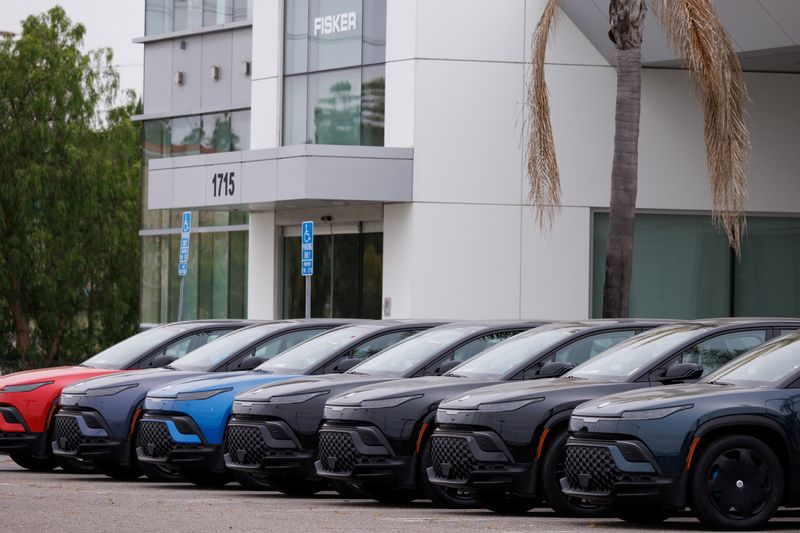(Reuters) -Fisker filed for bankruptcy protection on Monday, the latest electric-vehicle startup to succumb to fundraising difficulties, slow sales, as well as supply chain and distribution challenges.
Demand has been weak for Fisker (OTC:)’s flagship Ocean electric SUV. The company cut jobs and paused investments to slow cash burn, partnered with dealerships to boost sales and desperately sought an investment from a major automaker to stay alive. None of that worked.
Other U.S. EV startups are lowering manufacturing costs, laying off workforce, and racing to develop cheaper models to navigate a slump in demand due to steep borrowing costs.
RIVIAN AUTOMOTIVE
Rivian (NASDAQ:) this year shut down its assembly line for weeks to retool the facility – a move meant to reduce costs and help the maker of R1S SUVs and R1T pickup trucks turn profitable.
To boost demand and increase efficiency, Rivian recently announced the second generation of vehicles with new drive units, upgraded software and fewer parts.
After shying away from cutting the price of its vehicles last year, Rivian in February introduced lower-range options for its existing cars.
The startup has focused on reducing its cash burn by re-negotiating supply contracts and building some components in-house. Rivian posted cash and cash equivalents of $5.98 billion for the first quarter, compared with $7.86 billion in the fourth quarter.
In March, Rivian also introduced its smaller, less expensive electric R2 SUVs and R3 crossovers with plans to start producing the R2 at its existing U.S. factory to hasten deliveries in the first half of 2026.
LUCID GROUP
Lucid Group (NASDAQ:) said in May it will reduce its workforce in the United States by 6%. The company has missed analysts’ expectations for revenue for six straight quarters.
It has slashed the price of the Lucid Air Pure and is including two years of free scheduled maintenance and charging allowance as an incentive.
Lucid in November unveiled its Gravity SUV that will start under $80,000 and is expected to go into production late this year.
To attract a larger customer base, Lucid, backed by Saudi Arabia’s Public Investment Fund, is set to start production of a more affordable mid-size car in late-2026 with a price point of around $50,000.
Lucid ended the first quarter with cash and cash-equivalents of $2.17 billion, compared with $1.37 billion in the fourth quarter of last year.
NIKOLA
Nikola (NASDAQ:) is pivoting to big rigs powered by hydrogen, after some of its battery-electric trucks caught fire in August and forced a recall.

The company expects up to $170 million in truck revenue for 2024 with a target to sell 450 units this year, including its hydrogen fuel cell electric trucks.
Nikola’s cash and cash equivalents at the end of the first quarter was $345.6 million, down from $464.7 million in December.
https://i-invdn-com.investing.com/news/indicatornews_1_800x533_L_1413124982.jpg
Source link
Reuters




